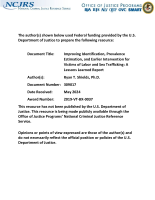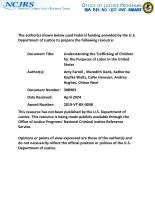Crime
NIJ FY24 Domestic Radicalization and Violent Extremism - Invited to Apply
NIJ Journal No. 285 — Focus on Domestic Radicalization and Terrorism
Improving Identification, Prevalence Estimation, and Earlier Intervention for Victims of Labor and Sex Trafficking: A Lessons Learned Report
Closing Cases Using Gunshot Residue
Not every crime scene will have definitive evidence, such as DNA, to link an individual to a crime. In those cases, law enforcement relies on other evidence to build the burden of proof. NIJ graduate research fellow Dr. Shelby Khandasammy developed a tool to analyze organic gunshot residue and distinguish between different firearms calibers and manufacturers. She joins Marie Garcia, office director for the Office of Criminal Justice Systems at NIJ, to talk about her work and experience as a research fellow.
SOCIAL CONSTRUCTION OF HATE CRIMES IN THE US: A FACTORIAL SURVEY EXPERIMENT
Just Science Podcast: Just Sexual Assault Response For Cases Without DNA Evidence
Just Science Podcast: Just Technology To Improve Sexual Assault Bruise Detection
The Empirics of Immigration and Homicide: Evidence from California and Texas
Understanding the Trafficking of Children for the Purposes of Labor in the United States
A State-wide Analysis of Characteristics and Predictors of Dual System Involvement Among Child Victims of Human Trafficking
Building "A Beautiful Safe Place for Youth" Through Problem-oriented Community Organizing: A Quasi-experimental Evaluation
Determining Economic Factors for Sex Trafficking in the United States Using Count Time Series Regression
Characterizing and Preventing Domestic Terrorism: A Mixed-Methods Study of Five Far-Right Terrorist Groups
Practices and Needs in Reintegration Programs for Violent Extremist Offenders in the United States: The Extremist Perspective
Preventing Relationship and Sexual Violence on College Campuses
Tools to Support Campus Sexual Assault Prevention and Response






